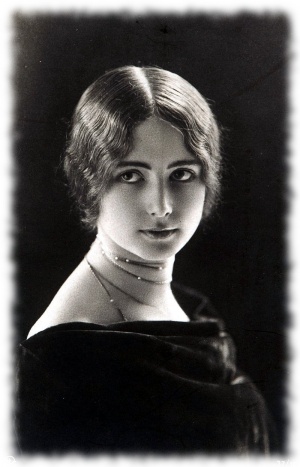Cléo de Mérode: Difference between revisions
(Created page with ";Paris - La Belle Époque [[]] <br> <br> '''Sobriquet:''' '''Appearance:''' '''Behavior:''' '''History:''' She was born in Paris, the daughter of Austrian landscape art...") |
No edit summary |
||
| (One intermediate revision by the same user not shown) | |||
| Line 1: | Line 1: | ||
;[[Paris - La Belle Époque]] | ;[[Paris - La Belle Époque]] | ||
[[]] | [[File:Mortal Cléo de Mérode 1903.jpg|300px]] | ||
<br> | <br> | ||
<br> | <br> | ||
Latest revision as of 22:21, 28 June 2017
Appearance:
Behavior:
History: She was born in Paris, the daughter of Austrian landscape artist Carl (also Karl) Freiherr von Merode (1853–1909). At the age of eight, Cléo was sent to study dance and made her professional debut at age eleven.
Cléo de Mérode became renowned for her glamor even more than for her dancing skills, and her image began appearing on such things as postcards and playing cards. A particular new hairstyle she chose to wear became the talk of Parisian women and was quickly adopted as a popular style for all. Her fame was such that Alexandre Falguière sculpted The Dancer in her image, which today can be seen in the Musée d'Orsay. In 1895, Henri de Toulouse-Lautrec did her portrait, as would Charles Puyo, Alfredo Muller, and Giovanni Boldini. Her picture was taken by some of the most illustrious photographers of the day, including Félix Nadar.
In 1896, King Léopold II attended the ballet and saw Mérode dance. The 61-year-old Belgian King became enamored with the 22-year-old ballet star, and gossip started that she was his latest mistress. Because the King had had two children with a woman reputed to be a prostitute, Cléo de Mérode's reputation suffered, and she had to live with it for the rest of her life. Nevertheless, Cléo de Mérode became an international star, performing across Europe and in the United States. At the peak of her popularity, she chose to dance at the Folies Bergère, taking the risk to do something other elites of the ballet had never done before. Her performance gained her a whole new following.
Very popular in her ancestral homeland of Austria as well as in Germany, her character appeared in the German film Women of Passion (1926), played by Fern Andra. In Vienna, her beauty caught the attention of painter Gustav Klimt, whose primary focus was on female sexuality. Their story was the basis of the film Klimt (2006), in which the character "Lea de Castro" is based on Cléo de Mérode.
Mérode continued to dance until her early fifties, when she retired to the seaside resort of Biarritz in the Pyrénées-Atlantiques département of France. In 1955, she published her autobiography, Le Ballet de ma vie (The Dance of My Life).
Cléo de Mérode died in 1966 and was interred in the Père Lachaise Cemetery in Paris in Division 90. A statue of her, mourning her mother, who is interred in the same plot, decorates the gravestone.
Recent Events:
